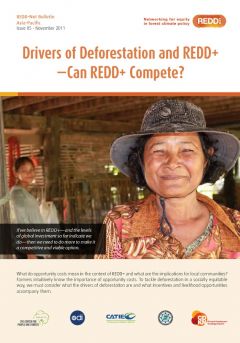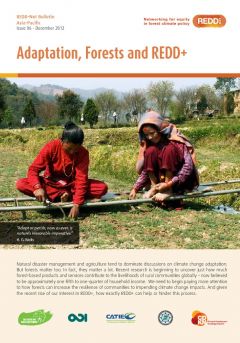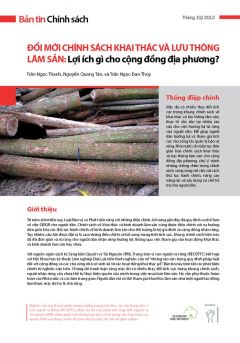Gender and forestry in Uganda: Policy, legal and institutional frameworks
Soybean and oil palm expansion in South America: a review of main trends and implications
Contribution of woodfuel to meet the energy needs of the population of Central Africa: Prospects for sustainable management of available resources
Les forêts du bassin du Congo - Etat des Forêts 2010
The Forests of the Congo Basin: State of the Forest 2010
Do collective property rights make sense? : insights from central Vietnam
We draw on empirical results from three case studies of property rights change across forest and fisheries ecosystems in central Vietnam to investigate the circumstances under which collective property rights may make sense. A
Desire for Greener Land. Options for Sustainable Land Management in Drylands
Humankind currently faces interconnected, worldwide challenges of feeding our rapidly growing population while simultaneously preserving our natural resource base, adapting to climate change, and creating or maintaining favourable living conditions for present and future generations. The world’s population is growing exponentially.
REDD-Net Asia-Pacific Bulletin #5: Drivers of Deforestation and REDD+
What do opportunity costs mean in the context of REDD+ and what are the implications for local communities? Farmers intuitively know the importance of opportunity costs. To tackle deforestation in a socially equitable way, we must consider what the drivers of deforestation are and what incentives and livelihood opportunities accompany them.
REDD-Net Asia-Pacific Bulletin #6: Adaptation, Forests and REDD+
Natural disaster management and agriculture tend to dominate discussions on climate change adaptation. But forests matter too. In fact, they matter a lot. Recent research is beginning to uncover just how much forest-based products and services contribute to the livelihoods of rural communities globally – now believed to be approximately one-fifth to one-quarter of household income.
Zero Net Land Degradation: A New Sustainable Development Goal for Rio+ 20
This report suggests that a new and explicit goal of sustainable development to be agreed as a result of Rio+20 should be the reduction of the rate of land degradation to achieve land degradation neutrality, which we refer to as “Zero Net Land Degradation” or ZNLD.
Đổi mới Chính sách Khai thác và Lưu thông Lâm sản
Mặc dù có nhiều thay đổi tích cực trong khung chính sách về khai thác và lưu thông lâm sản, thực tế vẫn tồn tại nhiều rào cản cho việc hưởng lợi từ rừng của người dân.






